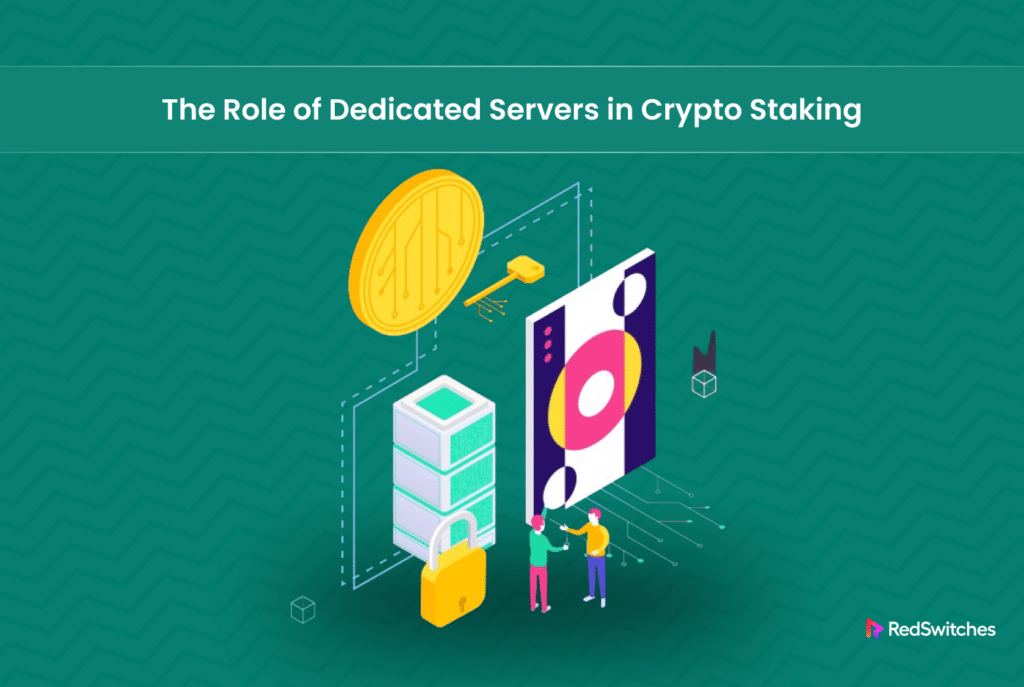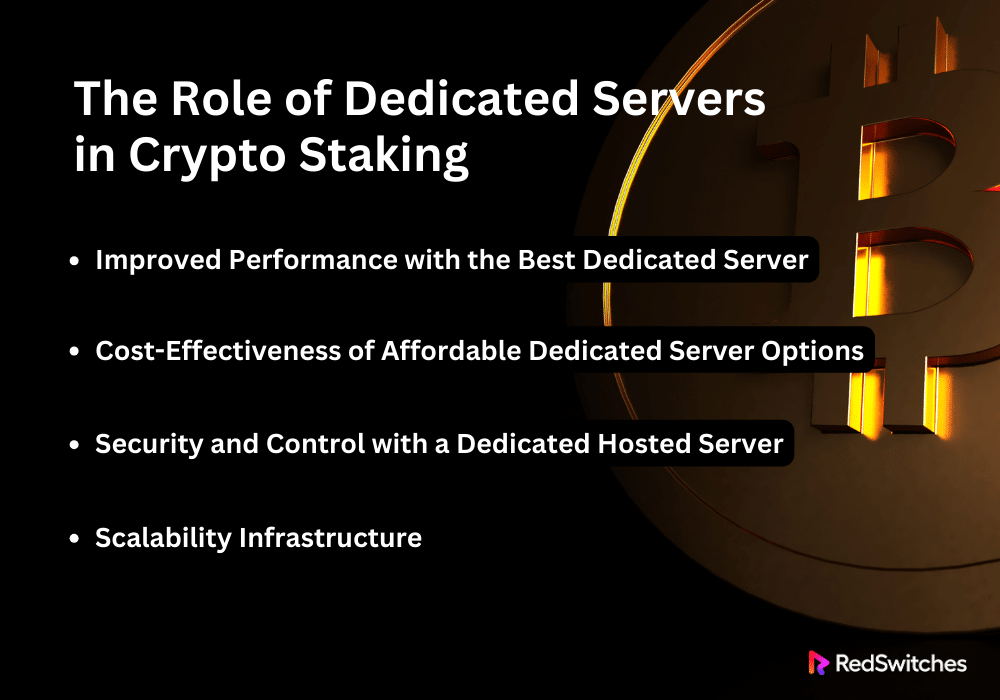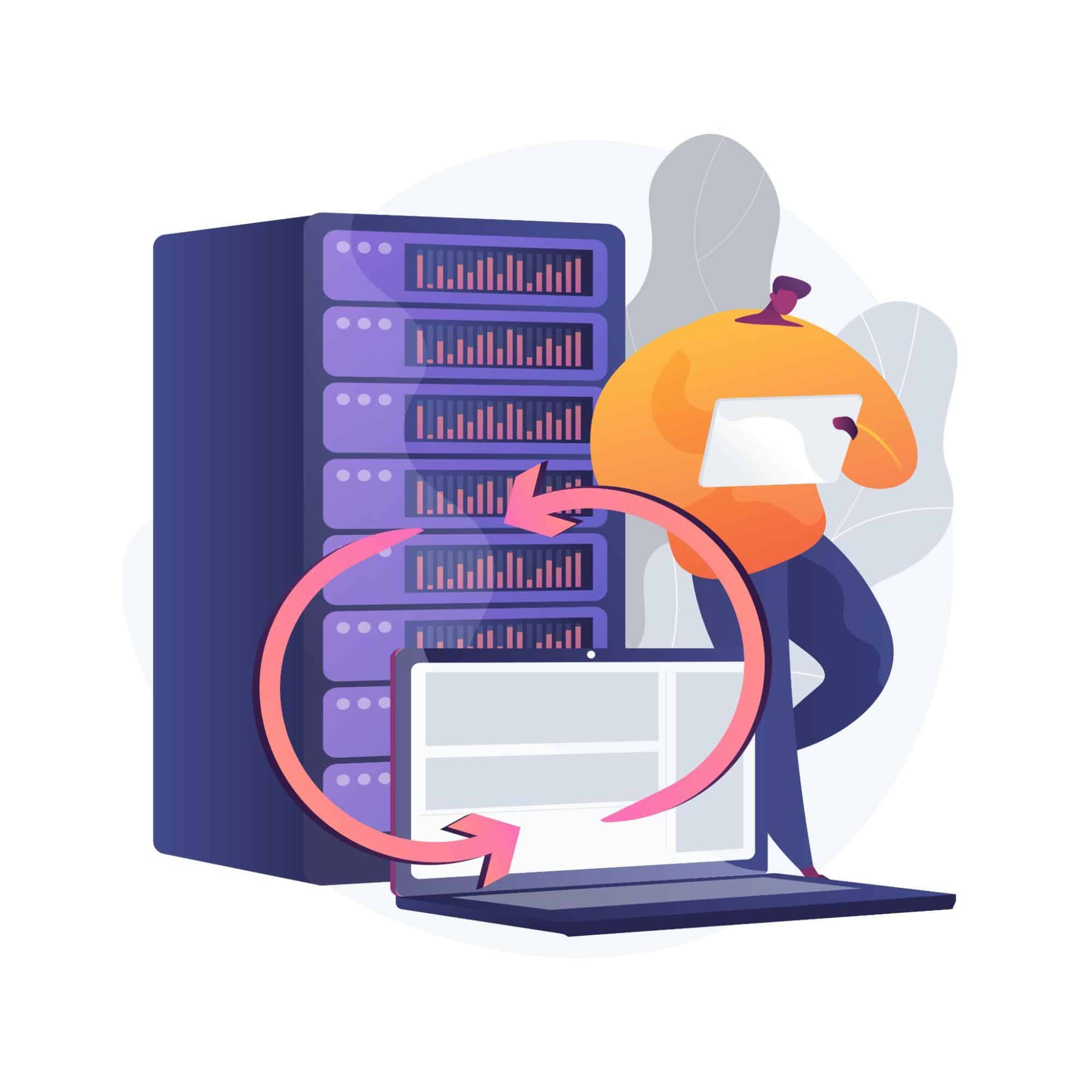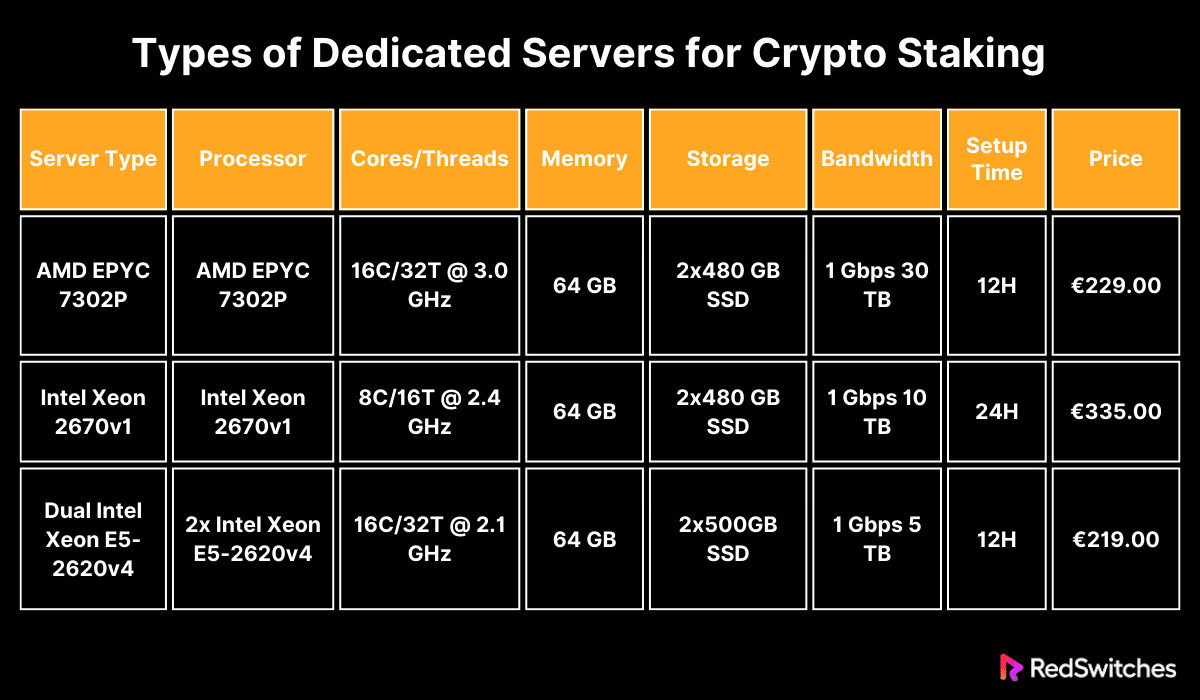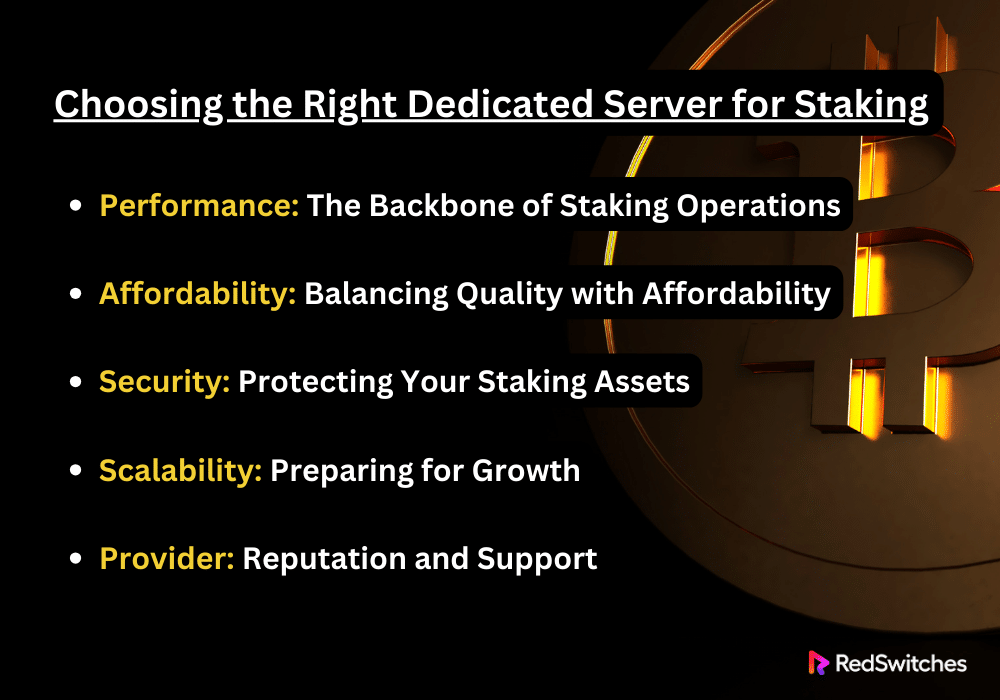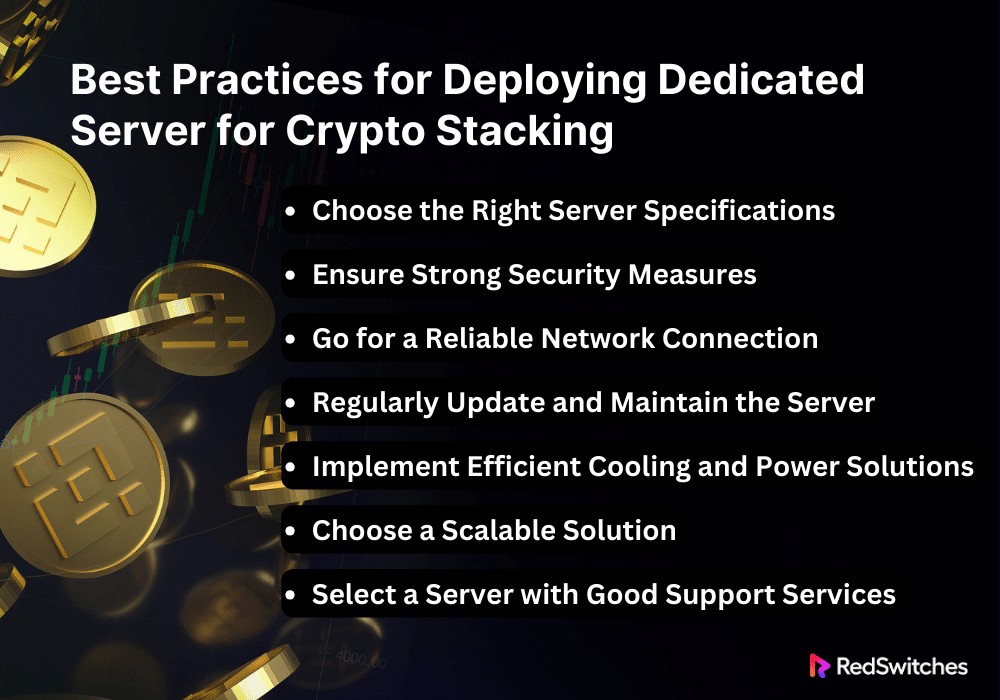Key Takeaways
- Crypto staking involves holding cryptocurrencies to support the operations of a blockchain network and receiving rewards in return.
- Dedicated hosted servers are powerful computers dedicated to serving the needs of one application or network.
- Dedicated hosted servers facilitate the staking process by providing the computational power required to validate transactions and secure the network.
- Different types of dedicated hosted servers, like AMD EPYC 7302P and Intel Xeon 2670v1 Dedicated Server, can be used for crypto staking.
- When choosing a dedicated hosted server for staking, factors include performance, reliability, cost, and compatibility with staking protocols.
- Anticipated advancements in crypto staking with dedicated hosted servers include increased automation, integration with decentralized finance (DeFi) protocols, and the emergence of specialized staking hardware.
To say the cryptocurrency staking sector is booming is an understatement. The revenue generated from the cryptocurrency industry is estimated to reach $51.5 billion by 2024. This popularity of staking activities underlines the importance of reliable infrastructure, where the best dedicated server solutions play an important role.
These servers are necessary for ensuring the uninterrupted operation and security of staking processes. As the demand for staking grows, the need for powerful, affordable, dedicated hosted server options becomes high among individuals and businesses looking to maximize their earnings and maintain network integrity. This blog will discuss the important role of dedicated servers in crypto staking.
Let’s begin!
Table of Contents
- Key Takeaways
- Understanding Crypto Staking
- Understanding Dedicated Servers
- The Role of Dedicated Servers in Crypto Staking
- Types of Dedicated Servers for Crypto Staking
- Choosing the Right Dedicated Server for Staking
- Best Practices for Deploying Dedicated Server for Crypto Staking
- Setting Up a Dedicated Hosted Server for Crypto Staking
- Future Trends in Crypto Staking with Dedicated Server
- Conclusion
- FAQs
Understanding Crypto Staking
Credits: FreePik
Crypto staking involves locking a specific amount of cryptocurrency to participate in the operation and upkeep of a blockchain network. This process is similar to a financial deposit, but instead of gaining interest in a conventional bank, participants earn rewards in the form of added cryptocurrency.
Staking is a blockchain feature that employs the Proof of Stake (PoS) consensus mechanism. PoS networks achieve consensus by having stakeholders (those who have staked their crypto) validate block transactions based on the amount of currency they hold and are willing to “stake” as collateral. Some variations of PoS, such as Delegated Proof of Stake (DPoS) and Leased Proof of Stake (LPoS), have slightly different mechanisms.
PoS differs greatly from Proof of Work (PoW) systems, in which miners compete to validate transactions and create new blocks by solving complex mathematical problems.
Are you interested in learning about the different types of staking? Read our informative blog, ‘Guide To Types Of Crypto Staking: Risks, And Platforms 2024.’
How Does Staking Work?
Here’s a closer look at every step in the staking process:
Choosing a Coin to Stake
To begin, you must select a cryptocurrency that supports staking. Not all cryptocurrencies can be used for crypto staking. Instead, you can only use those that operate on a Proof of Stake (PoS) or a comparable consensus mechanism, like Delegated Proof of Stake (DPoS) or Leased Proof of Stake (LPoS).
Coins like Ethereum and Tezos are popular choices for staking due to their PoS mechanisms. Researching and understanding each cryptocurrency’s specific staking requirements and rewards is important before committing your assets.
Participating in Staking
Once you have selected a suitable coin, there are two ways to participate in staking:
- Direct Staking: This involves keeping a predetermined quantity of your preferred cryptocurrency in a suitable wallet. Direct staking frequently necessitates satisfying minimum holding quantities and, in certain cases, technical expertise to set up and manage the staking process.
- Staking Pools: If direct staking appears difficult or you do not satisfy the minimal standards, staking pools are a practical option. These pools enable many investors to combine their crypto assets to achieve staking requirements and split the resulting benefits. Participating in a staking pool can simplify staking and give a more accessible starting point for those with tiny quantities of cryptocurrency.
Understanding Dedicated Servers
Credits: FreePik
A dedicated hosted server is a form of remote server used only by one individual, company, or application. Unlike shared hosting, which allows numerous clients to share a single server’s resources, a dedicated hosted server assigns all of its resources to a single client. It means the client has complete access to the server’s CPU, memory, and storage, improving performance, more control, and security.
How Does a Dedicated Hosted Server Work?
Here’s a breakdown of a dedicated hosted server working mechanism:
- Hardware Exclusivity: The server’s physical resources, such as memory, CPU, and storage, are meant for one client. This assures that all computing power and storage capacity are always accessible and not shared or influenced by others.
- Network Connection: The dedicated hosted server connects to the internet via a high-speed network. This ensures that both the server’s user and visitors to their website or application have quick and dependable access.
- Software and Configuration: Users can install and run whatever software they need. They may customize the server’s settings, operating systems, and programs to meet their requirements, improving server performance and usefulness.
- Security and Control: Since the server is not shared, data breaches and cyber-attacks are much less likely. Users can secure their data and apps with security measures like firewalls and encryption. But they also require more management and technical expertise than shared hosting or VPS solutions.
- Maintenance and Upgrades: Users are responsible for or can choose managed services to maintain and upgrade the server. This includes security patches, regular updates, and hardware upgrades to ensure the server stays secure and efficient.
Also Read: What Is Staking Crypto? How To Earn Crypto Rewards.
The Role of Dedicated Servers in Crypto Staking
So why are dedicated hosted servers important and recommended by experts for crypto staking? The answer to this requires developing an in-depth understanding of the role of these servers in crypto staking:
Improved Performance with the Best Dedicated Server
Uptime and connectivity are critical factors to ensure in crypto staking. Stakers must ensure their nodes are always online and communicate with the network to earn staking rewards.
This is where the best dedicated server solutions stand out. These servers provide the robust performance and reliability needed to maintain continuous network presence, an important aspect of maximizing staking rewards.
Cost-Effectiveness of Affordable Dedicated Server Options
Finding an affordable dedicated server is crucial to ensuring the profitability of staking operations for many staking ecosystem participants. These cost-effective servers balance performance and expense, enabling small to medium-sized stakers to participate competitively in the staking market.
By lowering overhead expenses, stakers can improve their return on investment, making crypto staking more accessible.
Security and Control with a Dedicated Hosted Server
A dedicated hosted server offers enriched security and control, critical for protecting staked assets and maintaining node integrity. With a dedicated environment, stakers can implement custom security measures, monitor their systems closely, and make real-time adjustments to staking strategies.
This control helps mitigate risks and protect the staking process against cyber threats and network vulnerabilities.
Scalability Infrastructure
Credits: FreePik
The need for scalable hosting solutions will become evident as staking operations grow. A dedicated hosted server is highly adaptable. It can easily meet increasing demands, allowing stakers to upgrade their hardware and software configurations. This scalability ensures speakers can expand their operations without hassle or the limitations usually linked to less capable server setups.
Also Read: Automated Staking Scripts and Tools for Server-based Nodes
Types of Dedicated Servers for Crypto Staking
Crypto staking demands reliable and powerful hosting solutions to ensure optimal performance and security. Here’s an in-depth look at dedicated hosting servers suited for staking, focusing on their specifications, performance, and pricing.
AMD EPYC 7302P
The AMD EPYC 7302P server provides a reliable configuration for staking. Its high-core-count CPU excels at multitasking and effectively manages blockchain transactions. With 64 GB of RAM, it can handle large-scale staking operations, and the dual SSD configuration offers fast data access and processing.
The considerable bandwidth enables significant network activity, making it an excellent solution for individuals seeking a high-performance, best dedicated server for greater staking requirements.
Specifications
- Processor: AMD EPYC 7302P, 16 cores/32 threads @3.0 GHz
- Memory: 64 GB DDR4
- Storage: 2×480 GB SSD
- Bandwidth: 1 Gbps with 30 TB transfer limit
- Setup Time: 12 hours
- Price: Estimated €229.00
Intel Xeon 2670v1
This server, powered by Intel Xeon 2670v1, provides a robust basis for staking with a stable 8-core processor and enough RAM. It’s ideal for medium-sized staking operations.
Despite having a slightly lower core count and bandwidth limit than the AMD alternative, it remains a competitive option, especially for people who like Intel architecture. The increased price may provide desirable functionality or stability in particular staking scenarios.
Specifications
- Processor: Intel Xeon 2670v1, 8 cores/16 threads @2.4 GHz
- Memory: 64 GB DDR4
- Storage: 2×480 GB SSD
- Bandwidth: 1 Gbps with 10 TB transfer limit
- Setup Time: 24 hours
- Price: Estimated €335.00
Dual Intel Xeon E5-2620v4
With a dual-processor configuration, this dedicated hosted server strikes an ideal compromise between cost and capabilities. With 32 cores combined, it excels at managing concurrent operations, which is a necessity in crypto staking. The storage capacity is somewhat larger than the others.
Despite the lower bandwidth limit, it provides excellent value for stakeholders who want significant processing power without a large bandwidth requirement. Its low cost and rapid setup time make it an appealing alternative for budget-conscious stakeholders seeking dependable performance.
Specifications
- Processor: 2x Intel Xeon E5-2620v4, 16 cores/32 threads @2.1 GHz
- Memory: 64 GB DDR4
- Storage: 2x500GB SSD
- Bandwidth: 1 Gbps with 5 TB transfer limit
- Setup Time: 12 hours
- Price: Estimated €219.00
Also Read: 7 Best GPUs For Mining In 2024.
Choosing the Right Dedicated Server for Staking
With numerous server options available, how can you efficiently pick the ideal server? This task requires you to consider several factors, including:
Performance: The Backbone of Staking Operations
It is critical to pick a high-performance dedicated hosted server when it comes to crypto staking. Staking procedures require a server to handle continuous transactions while maintaining uninterrupted network access. Look for servers with:
- High uptime guarantees.
- High Configuration:
- High-performance processors (Intel Xeon or AMD EPYC)
- Ample RAM (Random Access Memory).
- Solid-state drives (SSDs) or NVMe storage for fast data access and minimal latency.
- High-speed network connectivity to ensure smooth communication with the blockchain network and other staking nodes.
- RAID (Redundant Array of Independent Disks) configurations for data redundancy and protection against disk failures.
- Dedicated support options.
This helps ensure the server can operate your staking apps efficiently, manage blockchain synchronization, and process transactions quickly.
Affordability: Balancing Quality with Affordability
While performance is critical, cost is also an important consideration. An affordable dedicated server that fits your staking needs without breaking the budget is excellent. However, be aware of extremely low-cost solutions that may compromise quality and dependability.
Instead, balance cost and performance, ensuring that the server offers good value for your money. Choose a provider with fair pricing and no hidden costs to help you efficiently budget your staking venture.
Security: Protecting Your Staking Assets
Did you know there were around 57 cryptocurrency thefts in the first quarter of 2023? With rising cyber threats, security is a critical aspect of staking. Security is critical since a server stores significant cryptocurrency assets and sensitive data.
When picking a dedicated hosted server for staking, ensure it offers robust security features to protect against cyber threats and unauthorized access. Look for servers with built-in security measures. These include:
- Firewalls.
- DDoS protection.
- SSL encryption.
- Regular security updates.
You must also ensure that the provider has a strong track record of security and offers regular updates and patches to safeguard your assets.
Also Read: Cost-benefit Analysis of Crypto Staking Using Dedicated Servers
Scalability: Preparing for Growth
As discussed above, dedicated hosted servers offer high scalability. As your staking operation flourishes, you will need additional resources to address the increased load.
Pick a server that can scale with your needs, offering easy upgrades to processing power, memory, and storage. This flexibility will ensure that your staking activities can grow smoothly without requiring a complete system overhaul.
Provider Reputation and Support
Consider the server provider’s reputation and level of service. A provider with a proven track record of hosting solutions for staking and other blockchain applications might be an invaluable resource.
Look for companies that provide 24/7 assistance and have experience managing the unique needs of staking operations. Good customer support may be critical in resolving issues promptly and reducing downtime.
Also Read: What Is Cryptojacking & How To Prevent It?
Best Practices for Deploying Dedicated Server for Crypto Staking
Implementing certain best practices can ensure a smooth and efficient deployment when deploying a dedicated hosted server for crypto staking. Some best practices recommended by experts include:
Choose the Right Server Specifications
As stated above, not every server will suffice for cryptocurrency staking. You need the best dedicated server that meets the particular needs of your blockchain application. This entails determining the CPU, memory, and storage requirements of the staking operation you want to conduct. To properly manage the blockchain’s processing needs, seek an economical server that compromises cost and performance.
Ensure Strong Security Measures
Security is critical in every aspect of cryptocurrency trading. Experts advise choosing a dedicated hosted server with advanced security features to protect your assets from threats. Implement strong firewalls, use encryption for data transmission, and regularly update your software to defend against vulnerabilities. Consider additional security layers like intrusion detection systems to protect your staking operations.
Go for a Reliable Network Connection
Staking demands a consistent, reliable internet connection in order to engage in the blockchain network successfully. Look for a dedicated hosted server provider with high uptime and a stable network infrastructure. A strong connection means that your server can constantly communicate with the blockchain network, which is necessary for verifying transactions and receiving staking rewards.
Regularly Update and Maintain the Server
Regular maintenance and upgrades to your server are important for keeping your staking activities going effectively. Update the server’s operating system and applications to take advantage of the most recent security updates and performance improvements. Scheduled maintenance reduces the chance of downtime while increasing the efficiency of your staking activities.
Implement Efficient Cooling and Power Solutions
Crypto staking can be resource-intensive, and ensuring your server has efficient cooling and power management systems is important. This extends the hardware’s lifespan and ensures that the server operates at optimal performance levels. Efficient power solutions can lower operational expenditures, making your staking efforts more profitable.
Choose a Scalable Solution
Your server architecture should be able to scale in response to your staking demands. Select a dedicated hosted server that supports quick hardware and bandwidth upgrades. Scalability guarantees that you may grow your staking capacity without causing major disruption or without a total infrastructure rebuild.
Select a Server with Good Support Services
Even with the best dedicated server, problems can occur. Having access to experienced support 24/7 can be a lifesaver. Whether your hardware fails or sudden network issues occur, a reliable support team can help you fix problems quickly and keep your staking operations operating smoothly.
Setting Up a Dedicated Hosted Server for Crypto Staking
So, how do you set up a dedicated hosted server for crypto staking? Let’s walk through the process:
Step 1: Configure the Server
Once you’ve chosen your server, the next stage is configuration. This involves setting up the OS (operating system) and installing all critical software. Due to its dependability and robustness, a stable and secure OS like Linux is often suggested for crypto staking. Configure network settings, like firewall rules, to ensure your server is protected and can communicate effectively with the blockchain network.
Step 2: Install Staking Software
Once your server is established, install the staking software for the coin you want to stake. Each blockchain has its unique staking methods and software requirements. Thus, it’s critical to read the official guidelines thoroughly. This phase frequently includes synchronizing the blockchain, which might take some time depending on its age and size.
Step 3: Transfer Crypto Assets
To begin staking, move your Bitcoin holdings to the wallet connected with your staking software to begin staking. Before moving any assets, ensure that your dedicated hosted server is safe. Protect your wallet with powerful encryption and multi-factor authentication to avoid cyber threats.
Step 4: Start Staking
You can begin the staking procedure by placing your assets in your staking wallet. This generally involves selecting the amount of cryptocurrency you wish to stake and activating the staking mechanism in your program. Once engaged, your server will start participating in the blockchain’s consensus process, verifying transactions and collecting staking rewards.
Step 5: Monitoring and Maintenance
Continuous monitoring of your dedicated hosted server is required to ensure it runs smoothly and safely. Regular upgrades to the server’s operating system and staking software are required to defend against vulnerabilities and improve performance. Monitor staking performance and tweak parameters as needed to optimize your revenue.
Also Read: Wallet BTC: 5 Ways To Keep Your Bitcoin Secure.
Future Trends in Crypto Staking with Dedicated Server
As technology, crypto space, and dedicated hosted solutions evolve, future crypto-stocking trends with dedicated hosted servers present exciting possibilities.
Improved Security Measures
As the risk of cyber attacks grows and threats evolve, the future will likely see increasingly powerful security measures. The best dedicated server solutions will likely come with even more thorough security procedures and capabilities to protect your data from cyberattacks.
Users of dedicated hosted servers should anticipate stronger firewalls, intrusion detection systems, and frequent security audits to prevent unwanted access and maintain the integrity of their assets.
Increased Scalability and Performance
As the number of individuals and businesses involved in crypto staking increases, so will the demand for scalable, high-performance server solutions. Affordable dedicated server alternatives must provide scalable capacity to accommodate the rising transactions while maintaining speed and availability.
This scalability means that staking activities may expand effortlessly to meet the growing demands of the cryptocurrency market.
Integration of Green Technologies
Sustainability is receiving the attention it deserves in the technology sector, and crypto staking is no exception. Future developments in dedicated hosting services will focus on environmentally friendly methods.
This move suggests that dedicated hosted server solution providers incorporate green technology, like energy-efficient hardware and renewable energy sources, to lower the carbon footprint of crypto-staking operations.
Decentralized Finance (DeFi) Integration
The combination of DeFi and cryptocurrency staking is an area primed for growth. Dedicated hosted servers will be critical to this integration, providing the infrastructure required to enable DeFi apps and services.
These servers will have high transaction throughput, low latency, and compatibility with multiple blockchain protocols, allowing smooth interaction between the staking and DeFi ecosystems.
Improved User Experience with Automation
The best dedicated server providers will prioritize improving the user experience through automation to attract and retain customers. Automated tools and services will make setting up and managing staking operations easier, allowing a broader audience to participate.
This automation will involve everything from automatic deployments to real-time monitoring and maintenance. It will let users focus on their staking tactics rather than the technical aspects of server management.
Also Read: What Is the Minimum Lockup Period for Crypto Staking?
Conclusion
Navigating the crypto-staking domain requires knowledge, strategy, and the right technological backbone. Dedicated hosted servers stand at the core of this ecosystem. They offer the necessary stability and security for successful staking operations. RedSwitches recognizes this critical need and offers some of the best dedicated servers in crypto staking domain.
With our affordable dedicated server options, we ensure you can engage in crypto staking effectively without incurring significant costs. Whether you are a seasoned investor or a newcomer to the crypto scene, we can equip you with the reliable infrastructure needed to capitalize on the opportunities of crypto staking. So what are you waiting for? Visit our website today to learn more.
FAQs
Q. Is crypto staking profitable?
Crypto staking can be profitable, allowing holders to earn rewards or interest on cryptocurrency holdings. However, profitability varies depending on the staking duration, crypto asset, and market conditions.
Q. Is there any risk in staking crypto?
While staking has many advantages, certain concerns exist, such as smart contract weaknesses, reduced penalties for misconduct, and market volatility that might affect the value of your staked assets. There are also liquidity concerns and the possibility of loss if the value of the staked cryptocurrency falls. Before investing, it is best to have good training to understand the risks and how to avoid them.
Q. What is crypto staking?
Staking is the process of actively participating in transaction validation on a blockchain network. Crypto staking involves holding funds in a staking wallet to support the network’s security and operations and earning rewards in return.
Q. How does staking work?
Staking functions by users locking a certain amount of crypto assets in a wallet to perform specific tasks on the blockchain, such as validating transactions and creating new blocks. In return, participants receive staking rewards based on their contribution.
Q. What are the benefits of staking in crypto?
Some key advantages of staking in crypto include earning rewards, actively participating in network governance, and supporting the decentralization and security of the blockchain ecosystem.
Q. How can I start staking my crypto assets?
To begin staking your crypto, you need to choose a suitable staking platform, transfer your funds to a staking address, and follow the platform’s specific instructions to start earning staking rewards.
Q. What is a staking pool?
A staking pool is a collective of users who combine resources to increase their chances of earning rewards through crypto staking. By pooling together crypto assets, participants can achieve more consistent returns.
Q. What is liquid staking?
Liquid staking refers to the process of staking assets while still maintaining their liquidity. This allows users to trade or transfer their staked tokens without delay, providing flexibility for investors.
Q. How can I choose a staking platform for my crypto assets?
To choose a staking platform for your crypto assets, consider the platform’s security features, supported cryptocurrencies, and the annual percentage yield (APY). Also, assess the platform’s reputation, user reviews, and the flexibility of staking terms.
Q. What advantages do dedicated hosted servers offer to crypto investors engaged in staking?
Dedicated servers provide crypto investors with improved security and performance stability. This is important for optimizing their role in the crypto ecosystem and mitigating the risks of staking crypto.
Q. How does a dedicated hosted server compare to a virtual private server (VPS) for crypto staking?
While a VPS offers a more cost-effective entry point, a dedicated hosted server delivers superior resources and reliability. This is important for serious crypto investors focused on long-term staking methods.
Q. Why is delegated staking becoming popular among participants in the crypto ecosystem?
Delegated staking is gaining traction as it allows investors to earn rewards without the technical complexities of direct staking. It leverages staking services on dedicated servers for better performance and security.
Q. According to a comprehensive crypto staking guide, what should I look for in a dedicated hosted server?
A comprehensive crypto staking guide would advise looking for a dedicated hosted server with robust security features, high uptime, and the ability to efficiently handle the chosen staking method’s demands.
